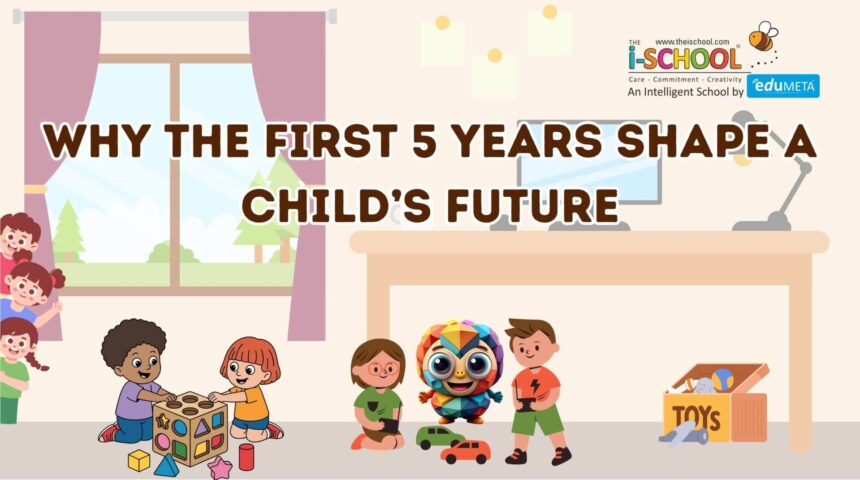Why the First 5 Years Shape a Child’s Future

The Magic Window of Growth
The first five years of a child’s life are often called the foundation years and rightly so.
During this short but powerful phase, a child’s brain develops faster than at any other point in life. According to Harvard University’s Center on the Developing Child, more than one million new neural connections form every second during these years.
Every experience, from hearing a lullaby to stacking blocks, influences how a child thinks, feels, and learns.
Simply put, the early years don’t just prepare a child for school; they prepare the child for life.
How the Brain Builds in the Early Years
A child’s brain is like soft clay, flexible and ready to be shaped.
Between birth and age five, it rapidly absorbs information from the environment.
Each positive interaction, whether it’s a smile, a story, or a gentle word, strengthens brain circuits responsible for learning and emotional health.
This is why responsive caregiving is key. When parents and teachers engage warmly, it helps build trust, language, and emotional balance.
Conversely, neglect or lack of stimulation can delay social and cognitive growth.
💡 Did you know? By age five, nearly 90% of brain development is complete. These early experiences lay the foundation for all future learning.
The Power of Play-Based Learning
Play is not a break from learning; it is learning.
Through play, children explore, imagine, and understand the world around them.
Imaginative play encourages creativity and empathy.
Physical play boosts coordination and motor skills.
Collaborative play develops communication and teamwork.
Psychologists emphasize that children who engage in meaningful play show stronger problem-solving abilities and higher emotional regulation.
🎲 Also read: The Power of Storytelling in Early Childhood Learning
Building Emotional Intelligence Early
Emotional intelligence (EQ), or the ability to understand and manage emotions, is as vital as IQ.
Children who are taught to express feelings and handle frustration early on grow up to be more resilient and empathetic.
Parents and educators can nurture EQ by:
• Naming emotions such as “I see you’re sad because your toy broke.”
• Encouraging calm solutions instead of quick reactions
• Modeling kindness and patience
High EQ in early years leads to stronger friendships, confidence, and adaptability — skills essential for both school and life.
Nutrition, Sleep and Routine: The Hidden Essentials
Brain development also relies heavily on physical well-being.
Proper nutrition fuels brain cells, while adequate sleep helps the brain organize and store new information.
For preschoolers, a balanced routine of meals, play, rest, and creative time supports steady growth.
Even a few simple habits like eating together as a family, consistent bedtimes, and limited screen time can make a major difference.
Parents as the First Teachers
Everyday interactions with parents are the most powerful lessons a child receives.
Reading bedtime stories, having small conversations, or exploring nature together strengthens a child’s language, memory, and curiosity.
Here are some easy ways to build your child’s foundation at home:
• Talk and listen actively; no question is too small.
• Introduce colors, shapes, and sounds during daily routines.
• Encourage creative mess through painting, building, or gardening.
• Offer choices to develop independence and decision-making.
💬 Explore more: Parent–Teacher Partnerships: The Secret to Preschool Success
A Balanced Start with eduMETA THE i-SCHOOL
At eduMETA THE i-SCHOOL, we bring together science, play, and compassion to create an environment where children truly thrive.
Our curriculum is based on experiential learning, ensuring every child learns through doing, exploring, and discovering.
We focus on stimulating classroom activities that boost brain connections, storytelling and art that strengthen language and imagination, emotional development through mindfulness and group interaction, and safe spaces that build confidence and curiosity.
By blending play, care, and early education research, i-SCHOOL ensures that each child builds a strong mind, gentle heart, and joyful attitude toward learning.
Conclusion: The Early Years Shape the Entire Journey
The first five years of life are more than just a beginning; they are the blueprint of a lifetime.
These years define how a child learns, loves, and connects with the world.
Every story told, every smile shared, and every question answered shapes a child’s future in ways we can’t always see but will always matter.
At eduMETA THE i-SCHOOL, we believe in nurturing not just smart learners but happy, balanced, and compassionate individuals. Because early learning isn’t just about readiness for school; it’s about readiness for life.
